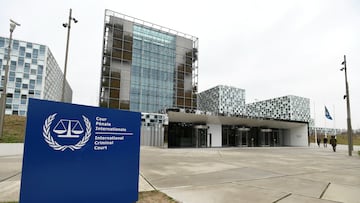What is the ICC? Arrest warrants issued for Netanyahu and Gallant for war crimes in Gaza
The ICC has issued arrest warrants for Israeli leaders Benjamin Netanyahu and Yoav Gallant. What is the court’s purpose and jurisdiction?


The International Criminal Court (ICC) has issued arrest warrants for Israeli Prime Minister Benjamin Netenhahu and former-Israeli Minister of Defense, Yoav Gallant. The ICC, not to be confused with the International Court of Justice (ICJ), focuses on the individuals responsible for violations of the Rome Statute. This treaty governs how those that commit genocide, war crimes, crimes against humanity, and crimes of aggression be treated under international law. The ICJ, on the other hand, allows member states to bring cases forward against another state when they are seen in violation of the United Nations Charter.
ICC Prosecutor Karim Khan, frequently criticized by the Israeli government, presented evidence compelling enough for the court’s judges to approve the warrants. The investigation focuses on actions taken between October 8, 2023, and May 20, 2024, during which Khan alleges the two officials knowingly deprived Gaza residents of essential resources, including food, water, medical supplies, and fuel. Such acts, if deliberate and systematic, constitute clear violations of international humanitarian law aimed at attacking civilian populations.
Situation in the State of Palestine:#ICC Pre-Trial Chamber I rejects the State of Israel’s challenges to jurisdiction and issues warrants of arrest for Benjamin Netanyahu and Yoav Gallant. Learn more ⤵️ https://t.co/opHUjZG8BL
— Int'l Criminal Court (@IntlCrimCourt) November 21, 2024
Prime Minister Netenyahu compares himself to Alfred Dreyfus
The ICC announced months ago its intention to request these warrants, which have now been issued. Within the Israeli government, the warrants are being viewed as an attack on the state’s right to self-defense.
The ICC is facing accusations of anti-Semitism—an allegation often directed at organizations critical of Israel’s campaigns in Gaza and Lebanon. In a post on X, the Prime Minister’s account described the ICC’s decision as “a modern Dreyfus trial,” referencing Alfred Dreyfus, a Jewish Frenchman falsely accused of espionage in the late 19th century. Dreyfus, scapegoated and imprisoned despite evidence of his innocence, has become a reference point in understanding anti-semetism and France, and across Europe, in the lead up to World War II and the Holocaust. By comparing his situation to Dreyfus, the Prime Minister attempts to frame the ICC’s actions as part of a broader pattern of institutionalized anti-Semitism.
The decision to issue an arrest warrant against the Prime Minister was made by a corrupt chief prosecutor who is trying to save himself from sexual harassment accusations and biased judges who are motivated by antisemitic hatred of Israel.
— Prime Minister of Israel (@IsraeliPM) November 21, 2024
For those unconvinced by the analogy, the X post further accuses ICC Prosecutor Karim Khan of corruption and sexual misconduct. Additionally, the judges who approved the warrants are described as being “motivated by anti-Semitic hatred of Israel.”
What will happen now?
The Israeli government and many of its allies are likely to disregard the ICC’s decision, which requires countries party to the Rome Statute to arrest the accused and transfer them to ICC custody. Neither the United States nor Israel is a party to the statute. However, all European countries are signatories, meaning if the Prime Minister were to enter their jurisdictions, those nations would be legally obligated to arrest him on behalf of the ICC.
Related stories
The United States has on multiple occasions said that they do not believe that the ICC has jurisdiction in the case, and that the Israeli judicial system is able to investigate incidents where international law is violated and hold perpatrators accountable.
Matt Miller: ICC doesn’t have jurisdiction over non-state actors
— HalalFlow (@halalflow) May 20, 2024
Intercept's @ryangrim: In 2024 Jen Psaki said you did
Miller: [Gives new reason for Israel] https://t.co/6WNMhGZOdA pic.twitter.com/Dc1BhTCTZU
In May, State Department Spokesperson Matt Miller, explained that since the Palestinian territories are not recognized as a state, and Israel is not a party to the Rome Statute the ICC did not have jurisdiction. Though Russia is not a signatory, the US has supported the ICC in issuing arrest warrants for Russian President Vladimir Putin, for war crimes the court found that his country carried out in Ukraine. The US defends the difference in their position by arguing that Ukraine is a party to the Rome Statute, but that highlights the vulnerable position the Palestinian people find themselves in.
Complete your personal details to comment